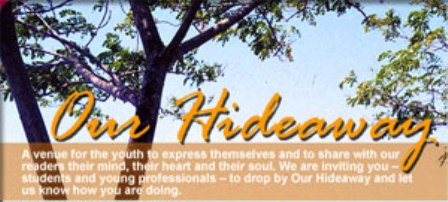Our Hideaway

Our Hideaway is a venue for the youth to express themselves and to share with our readers their mind, their heart and their soul.
WHAT YOU ARE IS WHAT YOU WERE
By Ann-Ann Gerong
 People say that what you are now is what you were before. Based on experiences that molded me and influenced my behavior, I agree.
People say that what you are now is what you were before. Based on experiences that molded me and influenced my behavior, I agree.
How I knew Lolo
One of my memorable experiences was when I was still a little child. We were living with my grandparents. I’ve lots of fond memories especially from the time when my grandfather was still alive. He was my ever-dearest grandfather, especially since he was the only one I knew. My maternal grandfather died when my mother was still in college. My grandfather’s name was Rafael or ‘Paeng’ to relatives and his many close friends, mostly teachers and men in politics. He was a man of integrity whom many went to for advice. He was retired and in his late 80s when I became old enough to know him.
His Lullabies
He took care of me until I was about three, the one who rocked my cradle and sang lullabies to me. My grandparents’ house was near the school. My grandfather could not take long walks because of partial paralysis after a mild stroke. Most of the time he would just sit at the front door and sell tamarinds to the grade school pupils who passed by our house on their way to and from school. When my father and mother left for work I would be at my grandfather’s side in my cradle.
Memories in the tape
Every time we were alone, he taught me songs and we’d sing together. One of his best-loved was an old folk-song in Cebuano, ‘Pagkagarboso,’ meaning ‘How Proud.’ I can also recall the time when he ‘interviewed’ me with questions such as, ‘What is your name?’ and the like, the usual stuff for kids, preparatory for schooling. I can’t forget it, since it was tape-recorded. The last time the tape was played back, I laughed because my English was very defective.
In Gratitude
Lolo is gone now. I sometimes feel sad at the thought that now that I’m grown-up and have improved my English, I miss the chance to interview him in return and ask him personally about his life. More especially, I miss the chance to thank him for all the precious moments he spent in taking care of me. Nonetheless, I know that he is happy for me now wherever he may be.
Close to my heart
Another person who is also special in my heart is my aunt. She’s a nun. When I was still very young, she was like my best friend and at the same time my audience. Every time we walked in the school grounds adjacent to our house, I used to run to the stage and recite a poem to her. I’d ask her to clap when I reached the stage and after my performance. When I finished my act, she’d laugh and whisper something to my father.
Our special bonding
On weekends we’d swim in the sea. Along the shoreline, we’d gather different kinds of stones, since she liked to collect anything that impressed her. We even played a game that I thought only we knew. It was called ‘The Alligator and the Crocodile.’ When we’d visit her at the convent, I’d to ask for some candies because I knew the nuns had lots of them.
Away in Germany
I had a great time with her before, but now we don’t see each other often because she’s in Germany. This year she visited us only once. Even if she’s far from us I know that we will always be in her heart. I’m so grateful for her giving her card collection to us as a souvenir.
Close family ties
The phrase in the opening sentence above, ‘What you are now is what you were,’ shows me to be a person who cares for family relationships, particularly those I maintained with relatives outside the immediate family circle, with our uncles, aunts and grandparents.
How it touches me, whenever I see a child with his or her grandfather or aunt, because those old and sweet memories rush back into my mind! Those times will never happen again. They are in the past, but once were part of my life.